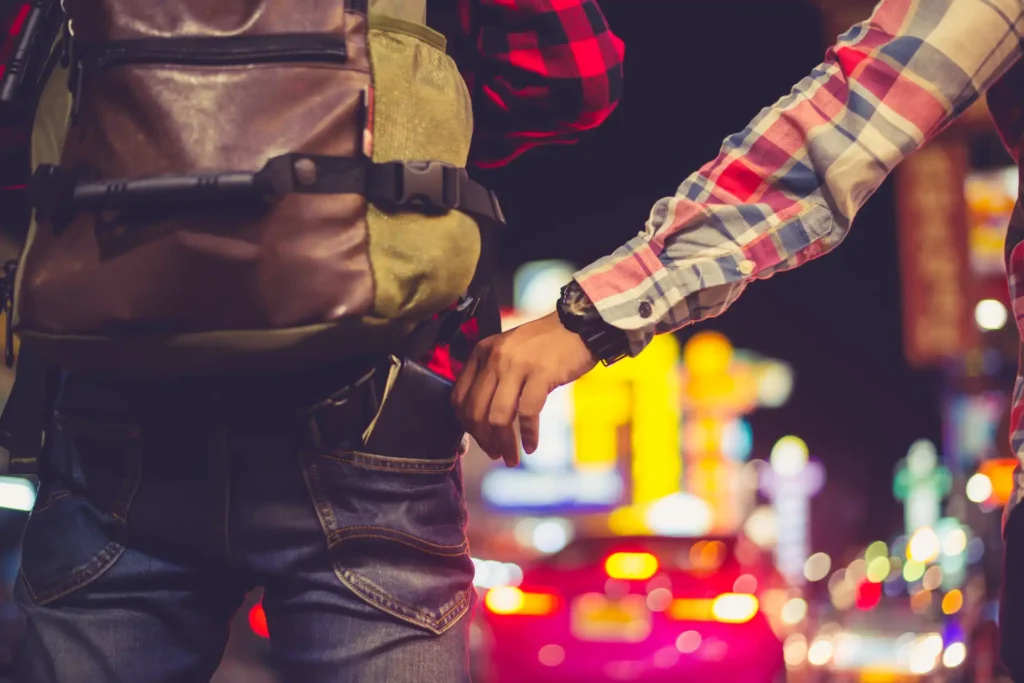
How to travel with cash. Top 10 tips to keep your money safe
Travelling with cash, especially in local currency, offers undeniable perks.
It simplifies transactions, often saves on fees, and is a lifesaver in places where digital payments aren’t widely accepted.
But it’s not without risks. Carrying cash means you might be a target for thieves, and there’s always the chance of losing it.
This post will explore the top 10 tips to keep your money safe. Ensuring you enjoy the benefits of travel cash while minimising the risks.
Whether navigating the busy streets of a foreign city or relaxing in a quaint village, understanding how to manage your cash can make all the difference.
From creative storage solutions to savvy spending strategies. These tips will prepare you for a secure and hassle-free adventure.
Tip 1: Diversify Your Cash Storage
One of the smartest ways to protect your cash is not to put all your eggs in one basket, or in this case, all your notes in one wallet. Splitting your money into different locations reduces the risk of losing everything if something goes wrong.
Be creative with hiding spots
Consider dividing your cash and storing it in various places. A money belt worn under your clothes is a classic choice, but don’t stop there.
Think about hidden compartments in your luggage and secret pockets in your clothing. Even perhaps inconspicuous items like a hollowed-out book or a false-bottomed container. Just remember where you put everything!
The role of money belts
While they might seem old-fashioned, money belts are a tried-and-tested method for keeping cash out of sight.
They’re handy for large amounts of money or important documents like your passport. Choosing a lightweight, slim design that won’t be noticeable under your clothes is a good idea.
By spreading your cash around, you’re guarding against theft and the simple mishaps of travel.
Whether it’s a lost wallet or a bag left behind, diversifying your cash storage means you won’t be left entirely out of pocket.
Get travel money fast
Tip 2: Use a decoy wallet
A clever trick in the traveller’s book is to carry a decoy wallet. This wallet holds a small amount of cash and perhaps some expired cards. If confronted by a thief, you’d offer this, keeping your real stash safe.
Creating a convincing decoy
The key to a successful decoy wallet is making it look believable. Put in a few notes, some old receipts, and maybe an expired debit card or two. This way, it seems like a genuine wallet, but you’re not losing anything valuable if it’s taken.
When and how to use it
Carry your decoy wallet in a more accessible place. Like your back pocket or a superficial compartment of your bag. Keep your real wallet in a more secure and hidden location.
If you find yourself in an uncomfortable situation, you can hand over the decoy without losing your actual funds and important documents.
Using a decoy wallet is a simple yet effective strategy to protect your main cash reserve. It offers peace of mind, allowing you to enjoy your travels with one less worry.
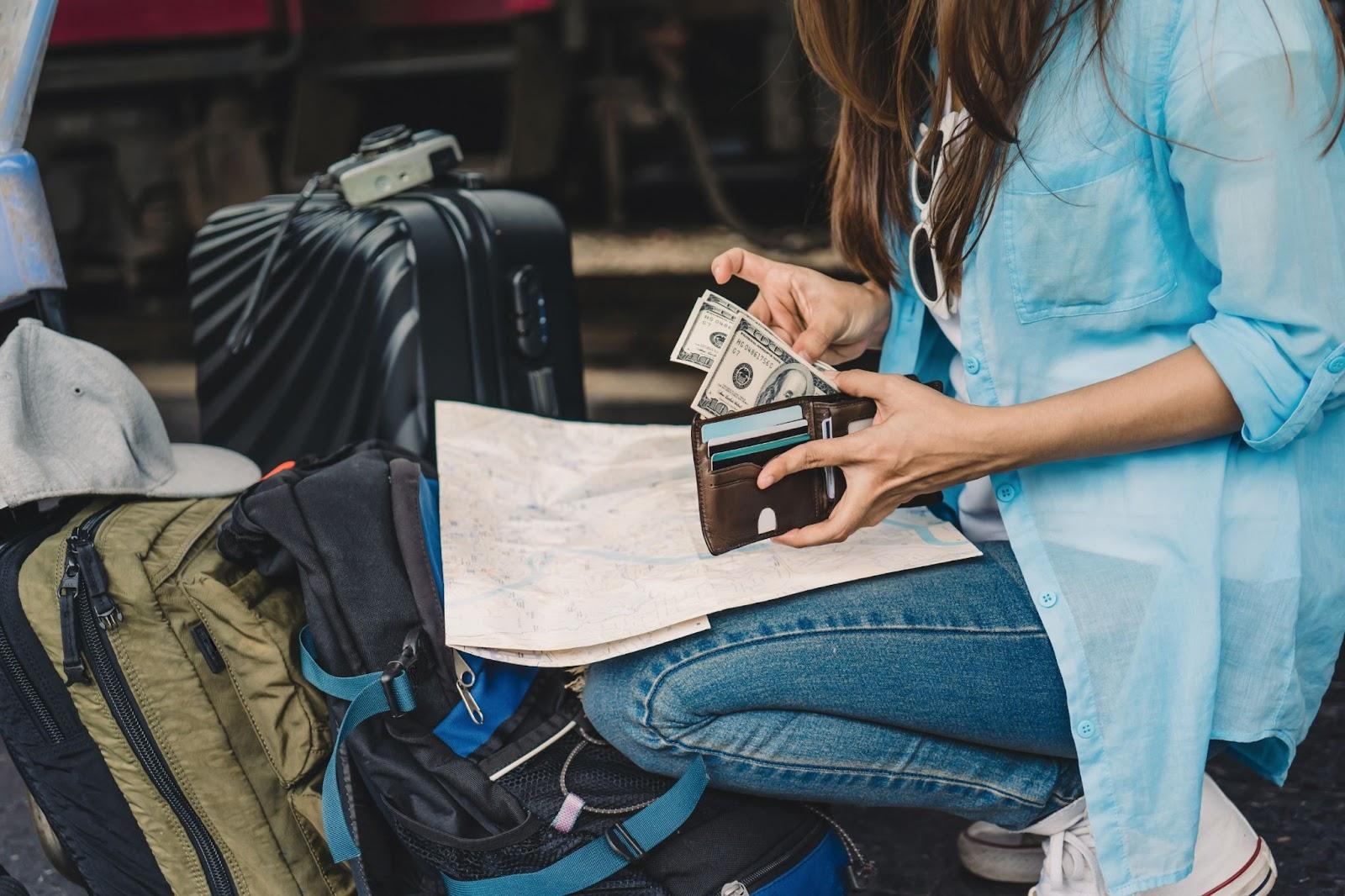
Tip 3: Be discreet when accessing cash
Being discreet when handling cash is crucial. Drawing attention to yourself while accessing your money can make you a target for thieves. Be aware of your surroundings and act cautiously.
ATM safety
When you withdraw money from an ATM, choose ones in well-lit, busy areas, preferably inside a bank. Be mindful of who’s around you, and cover the keypad when entering your PIN.
Once you’ve withdrawn cash, don’t count it openly. Tuck it away immediately and leave the area.
Paying discreetly
Avoid flashing large amounts of cash in shops, restaurants, or markets. Have small bills handy for minor purchases to reduce the need to expose your larger notes. This keeps your money safe and helps you blend in with the locals.
Bear in mind that staying low-key with your cash transactions helps maintain your security and significantly reduces the risk of becoming a target.
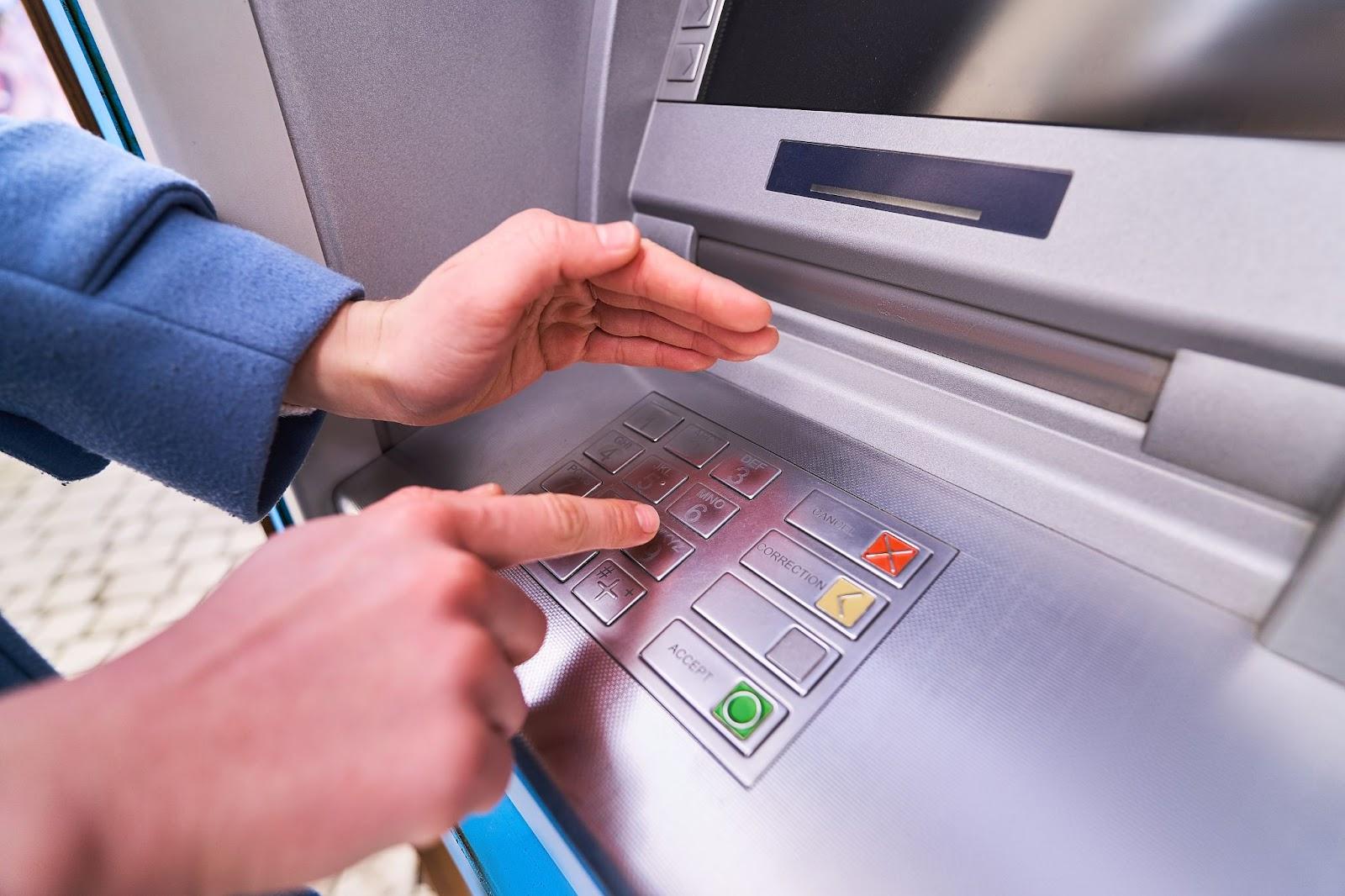
Tip 4: Understand the local currency
Getting familiar with the local currency is more than just a convenience; it’s a safety measure. Knowing the look and value of different notes and coins is key. It helps you handle transactions confidently and avoid being shortchanged or overcharged.
Learn before you leave
Before your trip, take some time to research the local currency. Look at pictures of the notes and coins to familiarise yourself with their appearance.
Understanding the basic denominations helps you quickly identify the right amount during transactions.
Currency conversion awareness
Be aware of the current conversion rates between the local currency and your home currency.
This knowledge is crucial, especially for larger purchases.
There are many smartphone apps available that can assist with real-time currency conversion. This helps you make informed spending decisions.
Being knowledgeable about the local currency not only protects your cash but also enhances your travel experience. It allows you to shop, dine, and explore confidently, knowing you’re paying the correct amount for your adventures.
Tip 5: Invest in a good quality travel wallet or pouch
A good quality travel wallet or pouch is a worthwhile investment for anyone carrying cash abroad. Keep your money organised and secure.
Features to look for
Choose a travel wallet or pouch that suits your needs. Look for features like RFID-blocking technology to protect against electronic pickpocketing. You’ll also want durable materials and a comfortable, discreet design for wearing under your clothes.
Multiple compartments can keep different currencies and essential documents like your passport separate and easily accessible.
Why it matters
A robust travel wallet or pouch keeps your cash and cards secure and in good condition. It also simplifies passing through airports and busy tourist spots. You’ll get quick access to your money and travel documents.
Having a dedicated place for your valuables makes you less likely to lose them or fall victim to theft.
Investing in a high-quality travel wallet or pouch is a simple yet effective way to enhance the security of your cash while travelling. This small detail can significantly impact your travel experience.
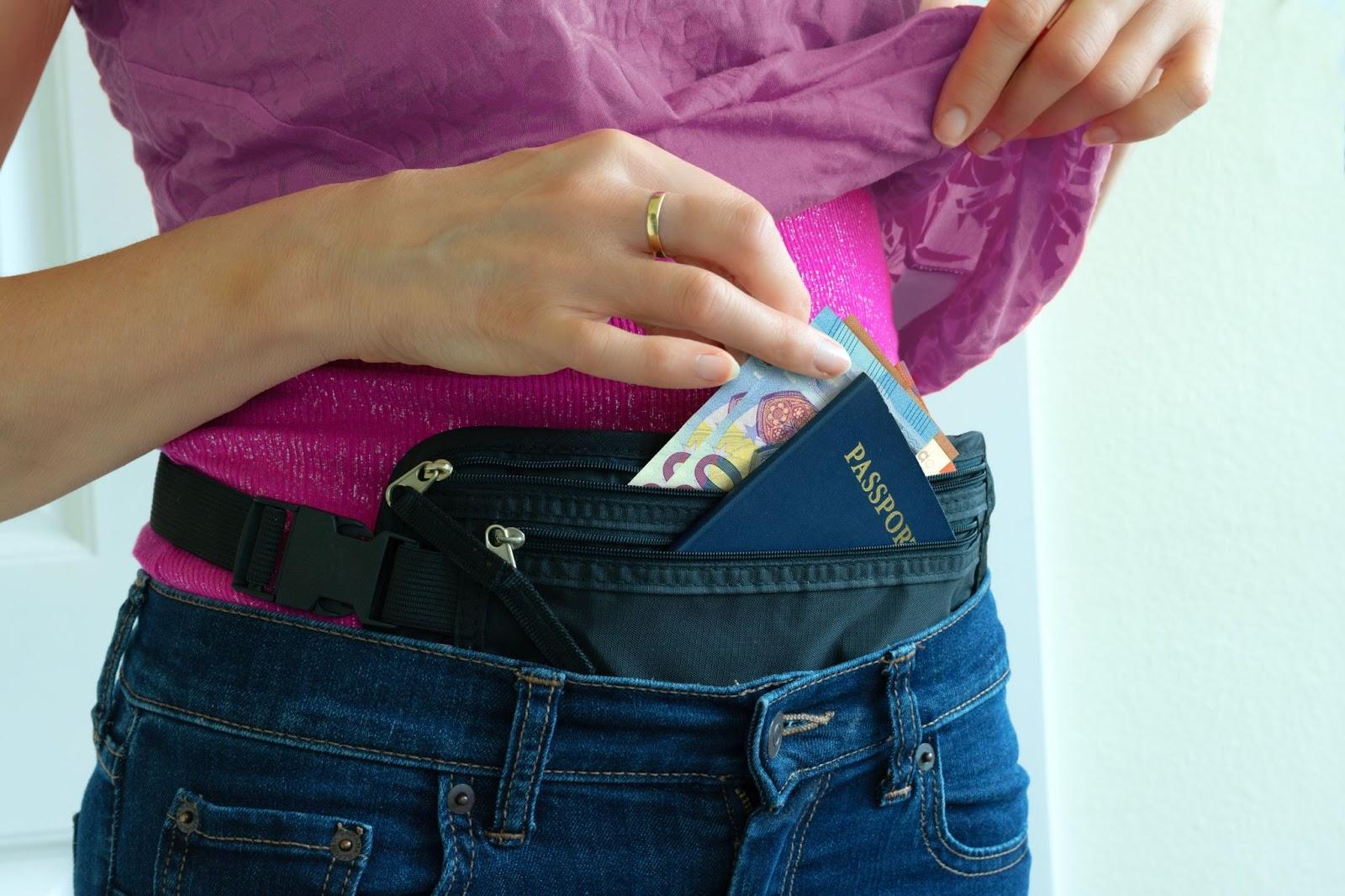
Tip 6: Avoid flashy displays of wealth
Blending in and avoiding drawing attention to yourself is critical to keeping your cash safe while travelling. Flashy displays of wealth, like wearing expensive jewellery or accessories, can make you a target for thieves.
Dress modestly
Opt for a more modest wardrobe that doesn’t scream ‘tourist’. This approach isn’t just about clothing; it extends to accessories, gadgets, and even the kind of bag you carry. The goal is to not stand out too much in the crowd.
Blend in with the locals
Observe how the locals dress and behave and try to adapt accordingly. This doesn’t mean completely changing your style but instead being mindful of how your appearance might be perceived.
By not appearing overly wealthy or foreign, you reduce the chances of being seen as an easy target for theft.
Remember, the less attention you draw to yourself, the safer your cash and valuables will be. Strike a balance between being comfortable and not standing out too much while enjoying your travels.
Get travel money fast
Tip 7: Regularly monitor your cash
Keeping a close eye on your cash is essential when travelling. Regular checks help you track your spending and ensure you’re aware of any potential loss or theft as soon as it happens.
Count your cash discreetly
Make it a habit to count your cash in a private and secure place, like your hotel room. Avoid doing this in public areas where you might attract unwanted attention.
Track your spending
Keeping a rough tally of your expenditures can be helpful. It doesn’t need to be detailed accounting, but a basic understanding of your spending pattern will alert you to discrepancies.
You can use a simple notebook or a budget-tracking app on your phone, whichever you find more convenient.
Regular monitoring of your cash is a proactive step in ensuring its safety. It helps manage your budget and quickly identifies if something has gone amiss, allowing you to take immediate action.
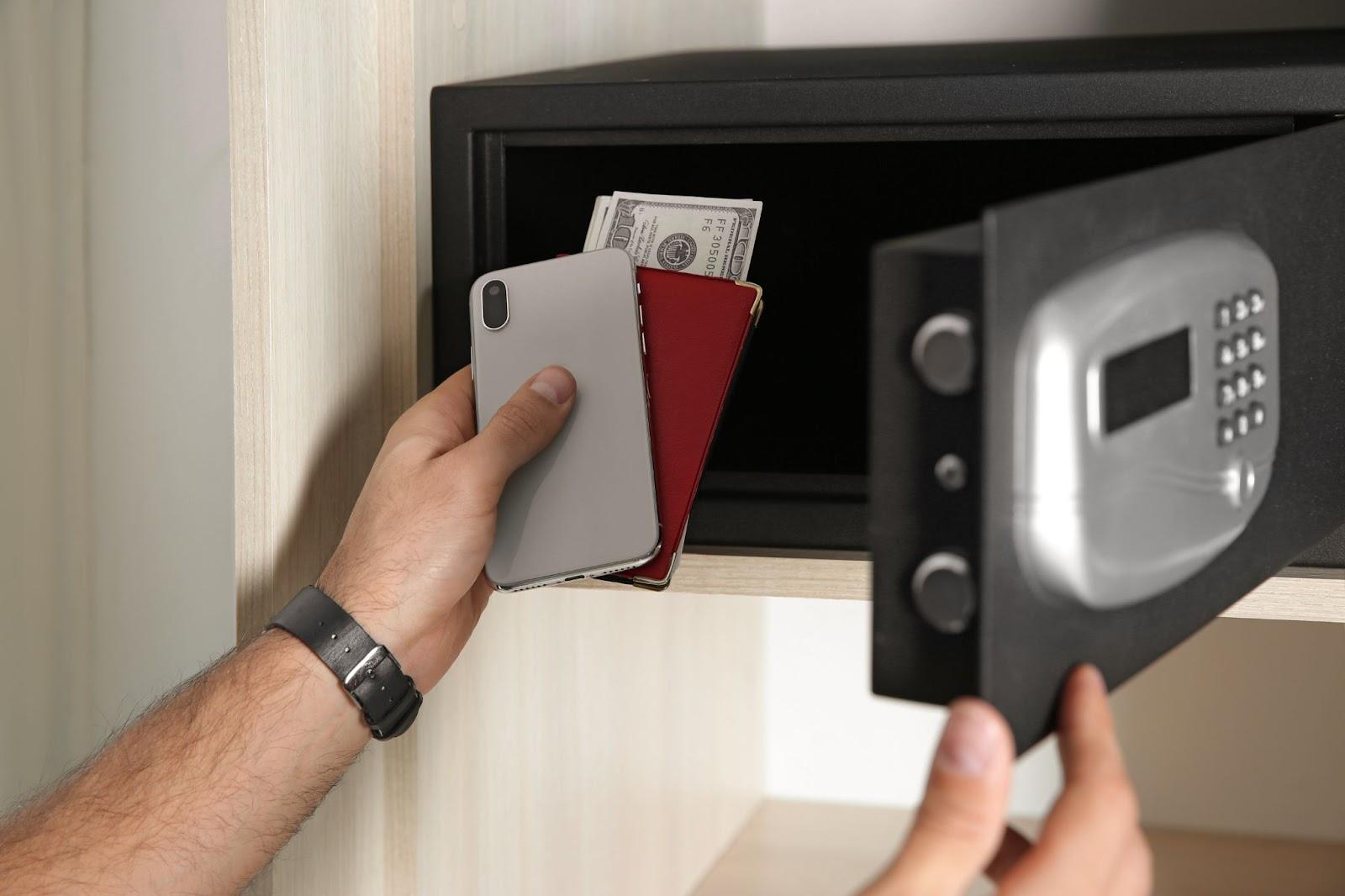
Tip 8: Use hotel safes for excess cash
When carrying more cash than you need for the day, a hotel safe can be a reliable way to store your excess funds securely. Carry the amount of money you anticipate needing and keep the rest locked away if you can
Storing cash safely
Most hotels provide a safe in the room or at the reception. Use these facilities to store extra cash and other valuables, like passports or expensive electronics. Ensure that you set a unique code that only you know.
Alternatives when safes aren’t available
When a safe isn’t available, look for other secure storage options. This might include locked luggage or creative hiding spots within your room or belongings. Always choose a place that is not obvious and is less likely to be accessed by others.
Using hotel safes or other secure storage methods for excess cash provides peace of mind. Allowing you to explore your destination without the burden of unnecessary risk.
Get travel money fast
Tip 9: Be wary of pickpockets and scams
Staying alert and informed about common pickpocket techniques and tourist scams is crucial for keeping your cash safe. Tourist-heavy areas are often hotspots for such activities, so extra caution is essential.
Understanding pickpocket techniques
Pickpockets typically work in crowded areas and are skilled at distracting you. Be cautious in busy markets, public transport, and tourist landmarks. Keep your belongings in front of you, and be wary of any unexpected bumps or commotion.
Avoiding scams
Familiarise yourself with common scams in the area you’re visiting. These can range from fake petitions to rigged taxi meters.
If an offer or request from a stranger seems too good to be true, it probably is. Trust your instincts and politely decline any suspicious offers.
By staying vigilant and educated about these risks, you significantly reduce your chances of falling victim to theft or scams.
Tip 10: Have a backup plan
No matter how careful you are, unexpected situations can happen. Having a backup plan in case you lose your cash or it gets stolen is crucial. This could involve having an emergency fund or alternative payment methods.
Emergency cash
Consider keeping a small amount of emergency cash separate from your main funds. This could be in a different part of your luggage or a hidden compartment in your clothing. It’s not meant for regular use but for emergencies only.
Alternative payment methods
Besides cash, have other means of payment, like a credit or debit card, stored securely and separately.
Inform your bank about your travel plans to avoid any blocks on your bank card or bank accounts for overseas transactions. Also, explore options like prepaid travel cards or mobile payment platforms.
A well-thought-out backup plan gives you a safety net in case of financial emergencies. It ensures you’re not stranded without resources, providing security as you explore new places.

Bonus tip: Get your travel money ahead of time with Manor FX
Planning ahead can save you a lot of hassle, especially regarding foreign currency. Securing your travel money with Manor FX before you leave has several benefits.
Convenience
You can easily order from the widest range of currencies available online from the comfort of your home. This saves you from the last-minute rush of finding a bureau de change with favourable rates.
Competitive rates
Manor FX offers the best exchange rates. By buying your currency in advance, you can take advantage of these rates. You’ll get much better value than if you exchange money at airports or tourist spots, where rates are often less favourable.
Home delivery
Get your travel money delivered directly to your home using our online foreign exchange. This ensures you have the foreign currency you need before packing your bags.
This service adds an extra layer of convenience and security. Upon arrival in a foreign country, you won’t need to search for a reliable exchange service.
Planning your budget
Having your foreign currency in hand before travelling helps you better plan your budget. You know exactly how much you have to spend, helping to avoid overspending or running out of cash unexpectedly.
Using Manor FX for your foreign currency can greatly enhance your travel preparation. With unbeatable convenience, better rates, and peace of mind.
FAQs
How do you carry cash when travelling?
When travelling, how you carry money safely is important. Here are some tips:
- Split your cash. Don’t keep all your money in one place. Spread it out in different pockets or bags. If one part gets lost or stolen, you still have the rest.
- Use a money belt. A money belt worn under your clothes is great for hiding cash. It’s discreet and hard for pickpockets to reach.
- Decoy wallet. Have a fake wallet with some cash and maybe some old cards. If someone tries to rob you, give them this wallet.
- Be discreet. When you need to take out cash, do it privately. Avoid showing off your money in public.
- Hotel safe. Use a safe in your hotel room to store extra cash. Carry only what you need for the day.
- Wear simple clothes. Dressing simply helps you blend in. Flashy clothes or jewellery can make you a target for thieves.
Where is the best place to carry cash on a plane?
The best place to carry cash on a plane is on your person, securely and discreetly:
- Money belt. Wear a money belt under your clothes. It’s a safe and hidden spot for cash and important documents like your passport.
- Carry-on bag. Keep a small amount of cash in your carry-on bag for easy access. Ensure this bag stays with you, under the seat or in the overhead compartment.
- Avoid checked luggage. Never put cash in checked luggage. Bags can get lost or delayed, and you don’t want to risk losing your money.
- Stay alert. Even when your cash is stored safely, always be aware of your belongings on the plane, especially during long flights or when sleeping.
Carrying cash securely on your body and in your carry-on helps ensure it stays safe throughout your flight.
Is it better to travel with cash?
It depends on where you’re going. Cash can be convenient in some places, helps with budgeting, and avoids card fees. However, carrying too much cash can be risky, so having a mix of cash and cards for different needs is often good.
How much cash should I have on hand when travelling?
When travelling, it’s wise to have a moderate amount of cash on hand for daily expenses. A good rule of thumb is to carry enough to cover small purchases, meals, and transportation for a day or two.
This amount typically ranges from £50 to £100, but it can vary depending on your destination and spending habits. Remember, carrying less and using cards or ATMs to withdraw cash when needed is safer. Carrying a large sum of cash can be risky.